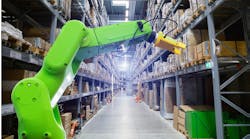Texas Instruments said that the market for analog semiconductors installed in factories and cars has slowed down, foreshadowing trouble for other product categories. On Tuesday, the company reported third-quarter revenue that increased from $4.12 billion to $4.26 billion over the last year. Profits ramped up from $1.29 billion, or $1.26 per share, to $1.57 billion, or $1.58 per share since last year’s third quarter.
Rich Templeton, chief executive of Texas Instruments, who was reinstalled in that role after Brian Crutcher was forced out of the company over misconduct, said in a statement that “demand for our products slowed across most markets.” The company’s core analog business expanded eight percent from the same quarter last year. Embedded processing sales declined four percent over the same period.
Texas Instruments, the largest manufacturer of analog chips, has the broadest product portfolio in the semiconductor industry. The company builds chips used inside tens of thousands of different electronic devices. That has turned the company’s earnings into a thermometer for the overall health of the semiconductor industry. So shares in the Dallas, Texas-based company plummeted on Tuesday—in addition to a number of other suppliers.
The company forecast fourth-quarter revenue in the range of $3.60 billion to $3.90 billion, according to Templeton. The midpoint of that range would be in line with the $3.75 billion it reported in the fourth quarter last year. Texas Instruments estimated earnings per share between $1.14 and $1.34 in the current quarter, an increase from the 34 cents per share earnings in the fourth quarter of 2017.
Texas Instruments has taken advantage of the increasing amount of analog content used in automobiles and factory equipment, which accounted for more than half of the chip manufacturer’s revenue last year. In the third quarter, industrial demand cooled. The automotive business increased double-digits percent over the last year, but the growth slowed compared to previous quarters, said chief financial officer Rafael Lizardi.
Personal electronics sales dropped slightly—"Increases at some customers were offset by declines at others," vice president David Pahl said on a conference call with analysts—in the third quarter. Texas Instruments also said that sales of analog chips used in wireless communications equipment ramped up significantly. That was the result of new 5G technology going into production, said Pahl.
The company has increased how long it holds inventory to more than four months. Texas Instruments was holding onto $2.1 billion of inventory, up almost 10 percent from the $1.9 billion of inventory it reported in the third quarter of 2017. The company’s revenue growth over the same period was only around four percent. Having high inventory levels generally means a company is manufacturing more products than it can sell.
Texas Instruments said that it would reduce wafer production in the fourth quarter but continue to amass components targeting the automotive and industrial sectors. The company “can still build those long-lived inventory buffers for industrial and automotive. Those parts live for a long, long time and they enable us to then support our customers on the other side of this slowdown,” Lizardi said on a conference call with analysts.
Texas Instruments has also considered the construction of a new 300-millimeter wafer fab in Richardson, Texas. The company said that it could start building the factory shell before the end of next year. “We are planning our next phase of 300-millimeter capacity expansion to be available as soon as 2020 or 2021,” Lizardi said on the conference call. The recent slowdown will have “little effect” on those plans.








